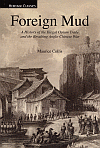
This is one those books that I had heard about, but that can be hard to find. A little like Sin City, Foreign Mud almost always appears in the bibliography of books about Shanghai history, but as it is published only in small quantities it is difficult to find. With a bit of luck, I found a copy in a Singapore bookstore.
“Foreign Mud, A history of the Illegal Opium Trade and the Resulting Anglo-Chinese War” is a reprint of a 1946 book. Shanghai’s history of foreign-Chinese relations always starts with the Nanjing Treaty of 1842 and George Balfour coming into town to create the British settlement in 1843. Foreign Mud deals with the period previous to the opium war and the Nanjing Treaty. The really interesting part of the book is the details about the tea trade as it was done in Canton (Guangzhou today), on the island of Shamian Dao in the 18th and beginning 19th century. Collis write beautifully about the relationship between the British traders and the Hong Merchants. Under the late Qing dinasty, China was closed to the outside world while Chinese products in particular tea and silk became very fashionable in Europe. The mostly British traders had to pay with silver, while not much could be sold in exchange to Chinese. As the demand for tea in Europe increased, the traders found a way around. The official trade was still of tea purchased in Canton following the imperial rules, but the silver required for it came from smuggling opium into China. Clippers were going up the coast, selling the “Foreign Mud” i.e. opium at various ports. The book clearly studies how the mix of greed from the British Merchants and corrupt Qing officials alike managed to develop the illegal trade. It also explain the origins of the large trading company that later dominated Shanghai trade such and Jardine & Matheson and Dent & Co.
One of the remarkable point of the Maurice Collis book is that he does not take side and describes facts very carefully and in a rather unbiased way. The book was published in 1946, when the British Empire was still fully existing, but Collis is strongly criticizing it. The way that Napier being played by the Chinese official is not far from a few modern stories I have heard. It also fascinating how little clue the late Qing Dinasty administration had about the formidable power that was coming at them. The British navy was very much advanced, but it took the influence of Jardine in London to actually approve the war. The way a country went to war with another, manipulated by a happy few for their own profit is also recalling some later parts of the XXth century history. Finally, it also show that not all the British ruling class was in favor of the opium trade in China considering it (rightly) a terrible thing. The actual motion approving the opium war passed Westminster with only 9 votes. This decision taken by a thin margin started the chain of events that led to the opening of the treaty ports and the birth of Shanghai as we know it.